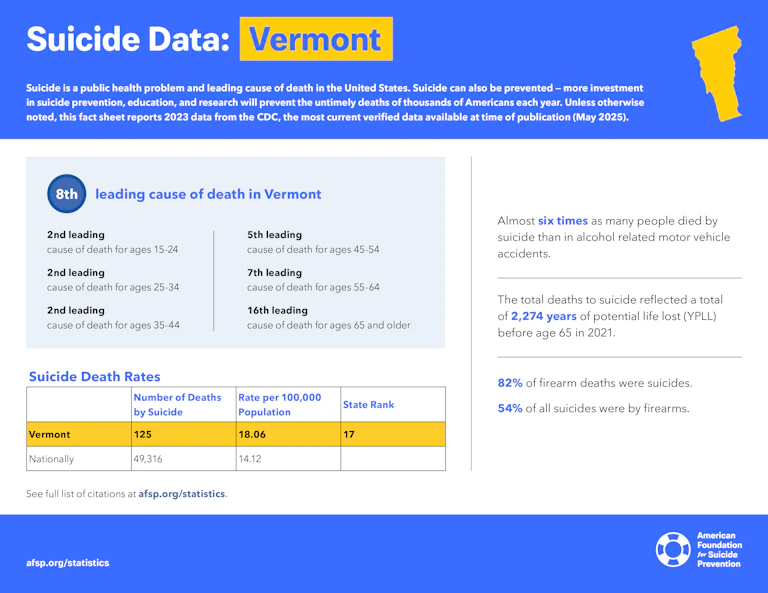Vermont

Vermont suicide prevention plans and initiatives
Vermont’s suicide prevention activities are housed within the state’s Agency of Human Services, Department of Mental Health (DMH) and led by the Vermont Suicide Prevention Center (VT-SPC), a program of the Center for Health and Learning created as a public-private partnership with the Agency that serves as a state-wide resource fostering a sustainable approach to suicide prevention in Vermont. State agency leaders, in alliance with VT-SPC, also created a broader group entitled the Vermont Suicide Prevention Coalition (VSPC), a public-private coalition with representation from public health, education, state agencies, advocacy groups, youth leadership, mental health services, and loss survivors, of which AFSP is a part and whose purpose is to advise the VT-SPC on suicide prevention efforts.
The Coalition is responsible for implementing the recommendations in the Vermont Suicide Prevention Platform: Working to Prevent Suicide Across the Lifespan, published by the VT-SPC in 2015. In 2017, Act 34 was passed requiring the Secretary of the Agency of Human Services to prepare a one-time report on Vermont suicide rates with national comparisons and provide recommendations and an action plan based on those data. The official Suicide Prevention Recommendations report was submitted to the legislature in January 2020.
In 2020, Vermont received a five-year grant from the Centers for Disease Control (CDC) to establish a comprehensive statewide suicide prevention initiative. The initiative, Facing Suicide Vermont, aims to develop a coordinated state suicide prevention effort, promote awareness of existing state suicide prevention resources, identify at risk populations and expand services for those populations, and support the adoption of suicide prevention activities for certain healthcare providers, first responders, and community partners.
Vermont laws
Key:
- Required by law
- Encouraged by law
- No law in place
Crisis lines and 988 implementation
- Addresses 988 infrastructure and provides for telecom user fee
- Addresses 988 infrastructure but does not include telecom user fee
- 988 law limited to creating an exploratory commission, advisory committee, or task force
Mental health parity
- Public health plans (e.g., Medicaid) regularly submit parity compliance analyses to state regulators
- Private health plans (individual and group) regularly submit parity compliance analyses to state regulators
K – 12 school suicide prevention
- Inclusion of the 988 Suicide & Crisis Lifeline and/or other crisis line(s) on student ID cards
- Student allowances for excused mental health absences
- School personnel must report student suicide risk to a parent and/or guardian
- Suicide prevention and/or mental health training for certain school personnel, annual
- Suicide prevention and/or mental health training for certain school personnel, not annual
- Suicide prevention, intervention, and postvention policies/programming
- Student education on suicide prevention
- Student education on mental health
Health professional training in suicide assessment, treatment and management
- Mental health professionals receive regular training
- Mental health professionals receive one time training
- Medical/surgical professionals receive regular training
- Medical/surgical professionals receive one time training
Conversion therapy bans
- Prohibits licensed/board certified mental health providers from engaging in conversion therapy with minors under 18 years of age
- Prohibits licensed/board certified mental health providers from engaging in conversion therapy with vulnerable adults
- Prohibits use of state funds for any purpose related to conversion therapy (e.g., conducting, making a referral for, or extending health benefits coverage for)
University and college campus suicide prevention
- Inclusion of the 988 Suicide & Crisis Lifeline and/or other crisis line(s) on student ID cards
- Students receive information on available mental health and/or suicide prevention services and/or resources
- Adoption of suicide prevention/awareness policy or program
Firearms
- Process for extreme risk protection orders (ERPOs)
- State voluntary do not sell list